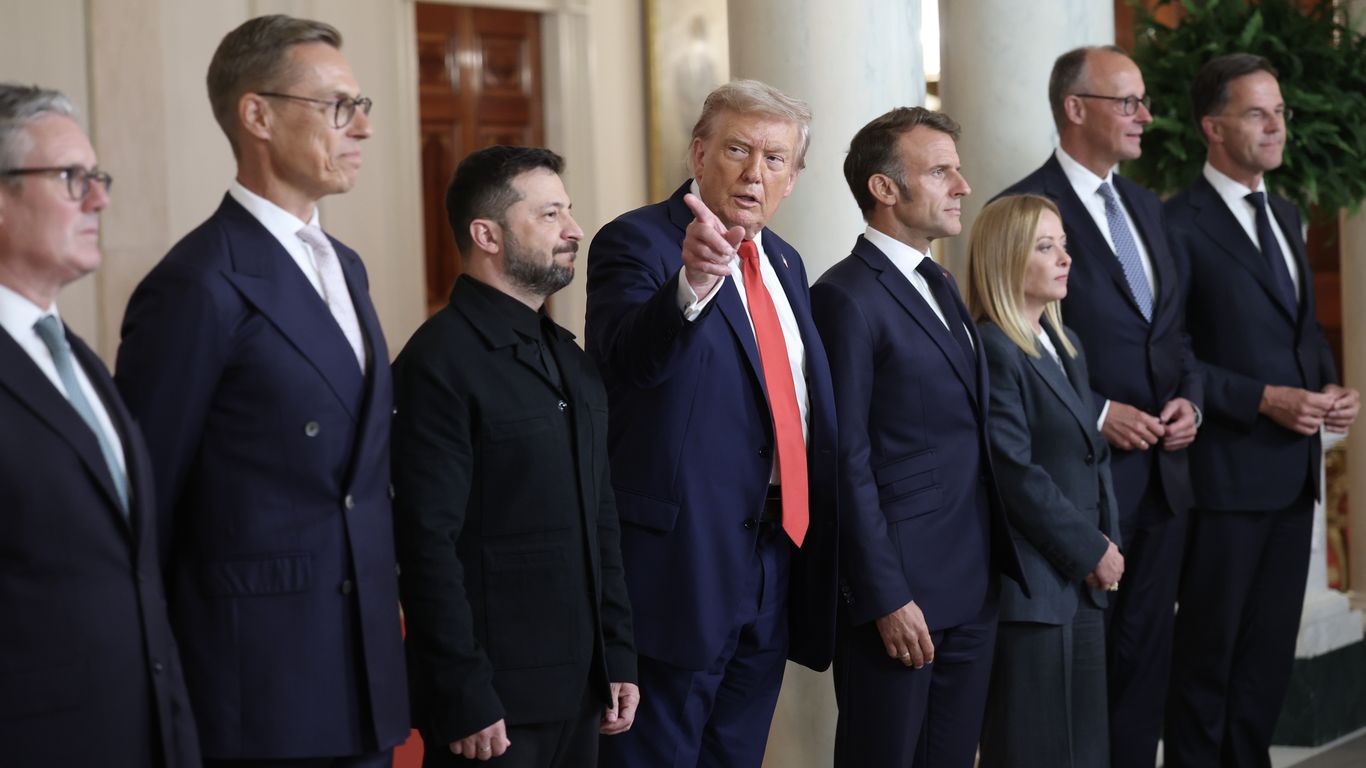Trump Considering National Housing Emergency

Introduction
The Trump administration is considering declaring a national housing emergency this fall, according to Treasury Secretary Scott Bessent. This move comes as the White House looks to address key issues for midterm campaign voters. Bessent made this statement in an interview with Bloomberg, highlighting the potential urgency of the housing situation in America.
Key Details
The potential declaration of a national housing emergency has sparked conversation and debate about the state of the housing market in the United States. With rising home prices and increasing demand, many are concerned about the availability and affordability of housing for the average American. This issue, if not addressed, could have major implications for the economy and the well-being of citizens.
Impact
If Trump does declare a national housing emergency, it could greatly impact the upcoming midterm elections. With housing being a crucial issue for many voters, the administration's response to this crisis could sway the outcome of the elections. Additionally, the actions taken to address the emergency could have a lasting impact on the housing market and the overall economy in the long term.
About the People Mentioned
Donald Trump
Donald John Trump, born June 14, 1946, in Queens, New York, is an American businessman, media personality, and politician. He graduated from the University of Pennsylvania’s Wharton School in 1968 with a degree in economics. In 1971, he took over his family’s real estate business, renaming it the Trump Organization, through which he expanded into building and managing skyscrapers, hotels, casinos, and golf courses. Trump gained widespread fame as the host of the reality TV show *The Apprentice* from 2004 to 2015, which helped establish his public persona as a successful entrepreneur. Trump entered politics as a Republican and was elected the 45th president of the United States, serving from 2017 to 2021. His presidency was marked by significant policy actions including tax cuts, deregulation, the appointment of three Supreme Court justices, renegotiation of trade agreements (notably replacing NAFTA with the USMCA), and a focus on immigration control including border wall expansion. He withdrew the U.S. from international agreements such as the Paris Climate Accord and the Iran nuclear deal, and engaged in a trade war with China. His administration’s response to the COVID-19 pandemic was criticized for downplaying the virus’s severity. Trump was impeached twice by the House of Representatives—first in 2019 for abuse of power and obstruction, and again in 2021 for incitement of insurrection—but was acquitted by the Senate both times. After losing the 2020 election to Joe Biden, Trump challenged the results, culminating in the January 6, 2021, Capitol riot. He remains a central figure in American politics, having won the 2024 presidential election and returned as the 47th president in 2025, continuing to promote policies aimed at economic growth, border security, and military strength[1][2][3][4].
Scott Bessent
Scott Bessent is an American government official and former hedge fund manager, currently serving as the 79th United States Secretary of the Treasury since January 28, 2025. Born on August 21, 1962, in South Carolina, Bessent graduated from Yale College with a degree in political science in 1984. Initially interested in journalism, he shifted to finance after missing out on a role at the Yale Daily News. He began his career with an internship under Jim Rogers, George Soros's first partner. Bessent's career in finance is marked by significant achievements. He was a key figure at Soros Fund Management, where he managed the London office and played a crucial role in profiting from major currency bets, notably earning $1 billion during the British Pound sterling crisis on Black Wednesday and $1.2 billion betting against the Japanese yen in 2013. After leaving Soros in 2015, he founded Key Square Capital Management, a global macro investment firm. Bessent also taught economic history as an adjunct professor at Yale University. In politics, Bessent has been involved as an economic advisor and major donor to the Donald Trump 2024 presidential campaign. His nomination as Treasury Secretary was announced by President-elect Trump on November 22, 2024, and he was confirmed by the Senate on January 27, 2025. As Secretary, Bessent focuses on maintaining economic strength, promoting growth, and enhancing national security through financial management. He is noted for his views on globalization and tariffs, advocating for updates to the international trading system to address inequality and economic disparities. Bessent's appointment marks him as the second openly gay man to serve in a U.S. Cabinet and the highest-ranking openly LGBT person in the federal government. His tenure as Treasury Secretary is expected to shape U.S. economic policies, particularly under the Trump administration's agenda.
About the Organizations Mentioned
White House
The **White House Office** is a central organizational component within the Executive Office of the President of the United States (EOP), tasked with supporting the President in managing day-to-day operations, policy formulation, and political affairs. It is headed by the White House Chief of Staff and staffed by senior aides who report directly to the President, including those with titles such as Assistant to the President and Deputy Assistant to the President. These staff members are mostly political appointees without the need for Senate confirmation, allowing the President considerable discretion in shaping the office to suit each administration's priorities[1]. Historically, the White House Office was established in 1939 through Reorganization Plan 1 and Executive Order 8248 to provide immediate assistance to the President. It functions as the nerve center for presidential staff, physically located primarily in the West Wing, and plays a pivotal role in managing the President’s policy agenda, communications, and political strategy. Its flexible organization allows each President to tailor the staff composition and roles according to their governance style and objectives[1]. In the current context of 2025, the White House Office operates under the administration of President Donald J. Trump, who returned to office after the 2024 election. His administration emphasizes rejecting prior policies deemed extremist and focuses on enhancing quality of life, economic growth, and American energy dominance. The administration includes Vice President JD Vance and First Lady Melania Trump, among others, with a Cabinet advising on various governmental functions[4][6]. Recent initiatives linked to the White House’s operational sphere include the establishment of a new **Department of Government Efficiency (DOGE)** aimed at modernizing federal technology and software to boost government productivity. The DOGE agenda is implemented through the renamed United States DOGE Service within the Executive Office, reflecting a concerted push to leverage technology for administrative modernization[5]. Notably, the White House Office also coordinates national security and homeland security functions through the National Security Council staff, underscoring its central role
Bloomberg
Bloomberg is a global financial, software, data, and media company renowned for its comprehensive business and technology news coverage and market data services. Founded in 1981 by Michael Bloomberg, the organization initially launched with the Bloomberg Terminal, an innovative computer system delivering real-time financial data, analytics, and trading tools to financial professionals. This product revolutionized how investors and institutions access and analyze market information, establishing Bloomberg as a critical player in the financial services industry. Over the decades, Bloomberg expanded beyond terminals to include Bloomberg News, Bloomberg Television, Bloomberg Radio, and a suite of digital platforms providing up-to-the-minute business news, analysis, and insights. The company is recognized for its authoritative reporting, in-depth market analysis, and extensive coverage of global economic trends, technology advancements, and geopolitical events. Its media division is a trusted source for professionals seeking real-time updates on financial markets and economic policy. Key achievements include pioneering the integration of financial data with news and analytics, helping democratize access to complex market information. Bloomberg’s terminal remains an industry standard, widely used by investment banks, hedge funds, and corporations worldwide. The company has also invested heavily in technology infrastructure, including AI and data analytics, driving innovation in financial intelligence and decision-making tools. Currently, Bloomberg continues to lead in delivering robust market data and insightful business news, adapting to evolving digital landscapes while maintaining its core mission. Its influence spans finance, media, and technology, making it a vital resource for investors, policymakers, and business leaders globally. Notably, Bloomberg's commitment to transparency, data accuracy, and technological innovation cements its reputation as a cornerstone of modern financial information services.

















